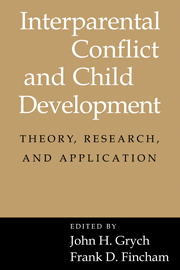Book contents
- Frontmatter
- Contents
- List of Contributors
- Preface
- Interparental Conflict and Child Adjustment: An Overview
- Part One Foundations
- 1 Conceptual Issues in Understanding the Relation between Interparental Conflict and Child Adjustment: Integrating Developmental Psychopathology and Risk/Resilience Perspectives
- 2 The Study of Relations between Marital Conflict and Child Adjustment: Challenges and New Directions for Methodology
- 3 Does Gender Moderate the Effects of Marital Conflict on Children?
- 4 Ethnic Minority Status, Interparental Conflict, and Child Adjustment
- Part Two Basic Processes
- Part Three Family and Peer Contexts
- Part Four Applications
- Part Five Future Directions
- Author Index
- Subject Index
2 - The Study of Relations between Marital Conflict and Child Adjustment: Challenges and New Directions for Methodology
Published online by Cambridge University Press: 01 May 2010
- Frontmatter
- Contents
- List of Contributors
- Preface
- Interparental Conflict and Child Adjustment: An Overview
- Part One Foundations
- 1 Conceptual Issues in Understanding the Relation between Interparental Conflict and Child Adjustment: Integrating Developmental Psychopathology and Risk/Resilience Perspectives
- 2 The Study of Relations between Marital Conflict and Child Adjustment: Challenges and New Directions for Methodology
- 3 Does Gender Moderate the Effects of Marital Conflict on Children?
- 4 Ethnic Minority Status, Interparental Conflict, and Child Adjustment
- Part Two Basic Processes
- Part Three Family and Peer Contexts
- Part Four Applications
- Part Five Future Directions
- Author Index
- Subject Index
Summary
While relations between marital conflict and children's adjustment are well established as a general proposition, many questions remain about the processes accounting for these relations. Various chapters in this volume are concerned with numerous substantive issues. Nonetheless, methodology is ultimately at the heart of the potential for new understanding of the psychological and systematic factors that account for children's outcomes, and the challenges are daunting. Marital conflict is a relatively rare event, especially as it occurs in front of children, may be reactive to the presence of observers in either the home or laboratory, and is not amenable for practical and ethical reasons to true experimental manipulation, particularly in the presence of children. The adequacy of current methodologies (i.e., research designs; measurement; statistical models) and the extent to which improvements and innovations can be made in the future as the envelope of knowledge expands are fundamental to the possibility of new advances.
This chapter begins with an examination of the significance of research design to the study of relations between marital conflict and child adjustment. Numerous child, marital, and familial factors are linked with the effects of marital conflict on child development. While all factors obviously cannot be addressed in every study, it is important to be cognizant of the breadth of possible causal influences and pathways. The cutting-edge of the field has moved beyond simple demonstrations of the correlations between marital conflict and child adjustment to a second generation of research that is concerned with testing complex models of the processes accounting for these relations (Fincham, 1994).
- Type
- Chapter
- Information
- Interparental Conflict and Child DevelopmentTheory, Research and Applications, pp. 39 - 63Publisher: Cambridge University PressPrint publication year: 2001
- 19
- Cited by

